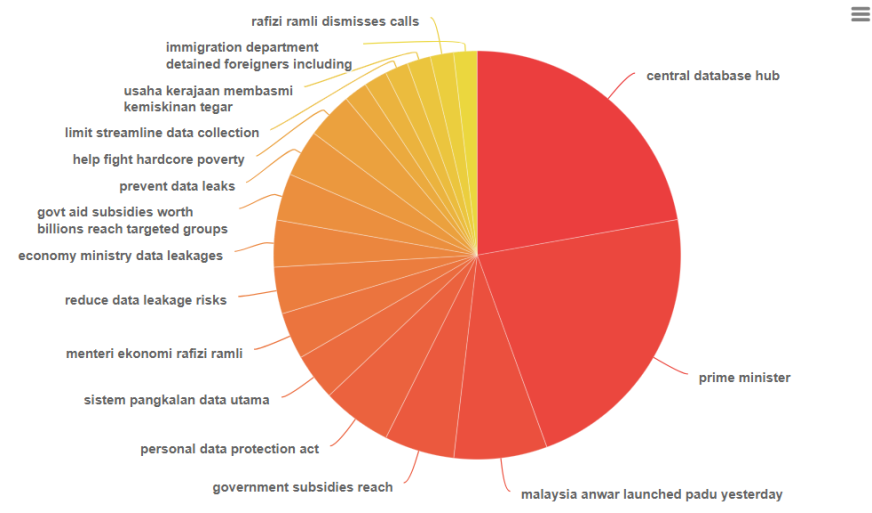PADU: A Game-Changer for Malaysia, A Win for All


In a significant leap towards modernizing governance, Malaysia has introduced the Pangkalan Data Utama (PADU) initiative, spearheaded by Rafizi Ramli, the Minister of Economy. Unveiled on January 2nd, 2024, PADU aims to serve as the centralized repository for individual and household data, potentially transforming how Government services operate within Malaysia.
Padu is a system containing individual and household profiles encompassing citizens and permanent residents in Malaysia. Developed through a collaborative effort involving the Ministry of Economy, the Department of Statistics (DOSM), and the Malaysian Administrative Modernisation and Management Planning Unit, what PADU can do actually?
- Data Consolidation for Informed Decision-Making: PADU consolidates information from over 400 government agencies, providing the government with a comprehensive overview of the national household income. The primary objective is to streamline policy making by ensuring accurate and complete data. PADU will provide information on income levels, housing situations, demographics, educational backgrounds, healthcare records, disability statuses through the number of dependents. Empowered by this comprehensive understanding, the government can then fine-tune social programs with heightened precision.
- Targeted Subsidies and Social Protection: PADU aims to enhance data accuracy specifically for targeted subsidies and social protection programs. This focus aligns with the government’s commitment to fair subsidy distribution.

- Shifting to targeted subsidies : With the rising concern of fair subsidy distribution, PADU employs an effective identification process to ensure subsidies reach the intended groups. The system’s objective is to prevent misuse and optimize the allocation of the RM81 billion budget spent on subsidies last year.
PADU represents a shift from traditional income categories (B40, M40, T20) to a more detailed household income assessment. This refined approach allows for precise subsidy allocations, enabling the government to tailor its programs based on household disposable income.
Economic Minister, Rafizi Ramli stated that Malaysia expects to save at least $1 billion to $2 billion a year from a shift to a targeted subsidy system in a bid to narrow its fiscal deficit. In 2022, Malaysia’s total subsidies recorded an all-time high of RM70.3 billion (operating expenditure: RM58 billion; Covid-19 Fund: RM12.3 billion), as compared to an annual average of RM15.2 billion for the past 10 years.
The Ministry of Finance added that subsidy rationalisation may create more fiscal space for spending on high multiplier impact programmes and projects; thus, a policy intervention supported by close engagement is required to smoothen the transition towards a gradual and targeted subsidy mechanism. It said that efforts to rebuild and increase fiscal space would have to be driven by both higher revenue collection and efficient resource utilisation.
The MoF also said that the World Bank has highlighted that Malaysia needed to phase out broad-based subsidies and move towards targeted subsidies through a cash transfer mechanism to support vulnerable groups better. The World Bank also suggested that the mechanism be applied gradually and reviewed periodically to avoid an abrupt subsidy removal that could lead to a sharp increase in inflation.
The subsidy rationalisation aims to enhance efficiency in the economy and rebuild fiscal space while minimising the risk of economic shocks.

With Malaysia’s national poverty rate standing at approximately 6.2% and a population of around 34 million, PADU’s potential impact is substantial.If the program operates with a 50% effectiveness rate, it could extend assistance to about 1 million people, showcasing the far-reaching benefits of its data-driven strategy.
Additionally, the targeted approach could yield significant monthly subsidy savings, estimated at approximately RM500 million, emphasizing the efficiency gains achievable through PADU’s precision in resource allocation.

As Malaysia steps into a new era of data-driven governance, PADU stands as a cornerstone in the quest for more effective, responsive, and accountable public administration. The potential for positive change is substantial, promising a brighter and more prosperous future for the nation and its citizens.
Its benefits span from improving the efficiency and accuracy of government services to better targeting social programs, reducing fraud and waste, driving economic development, and enhancing transparency and accountability.

